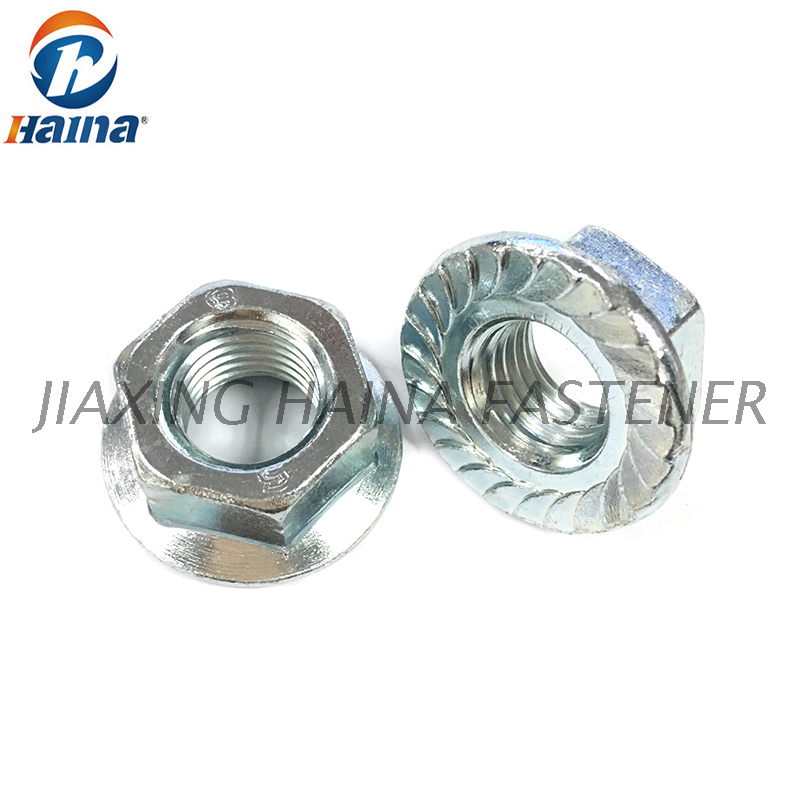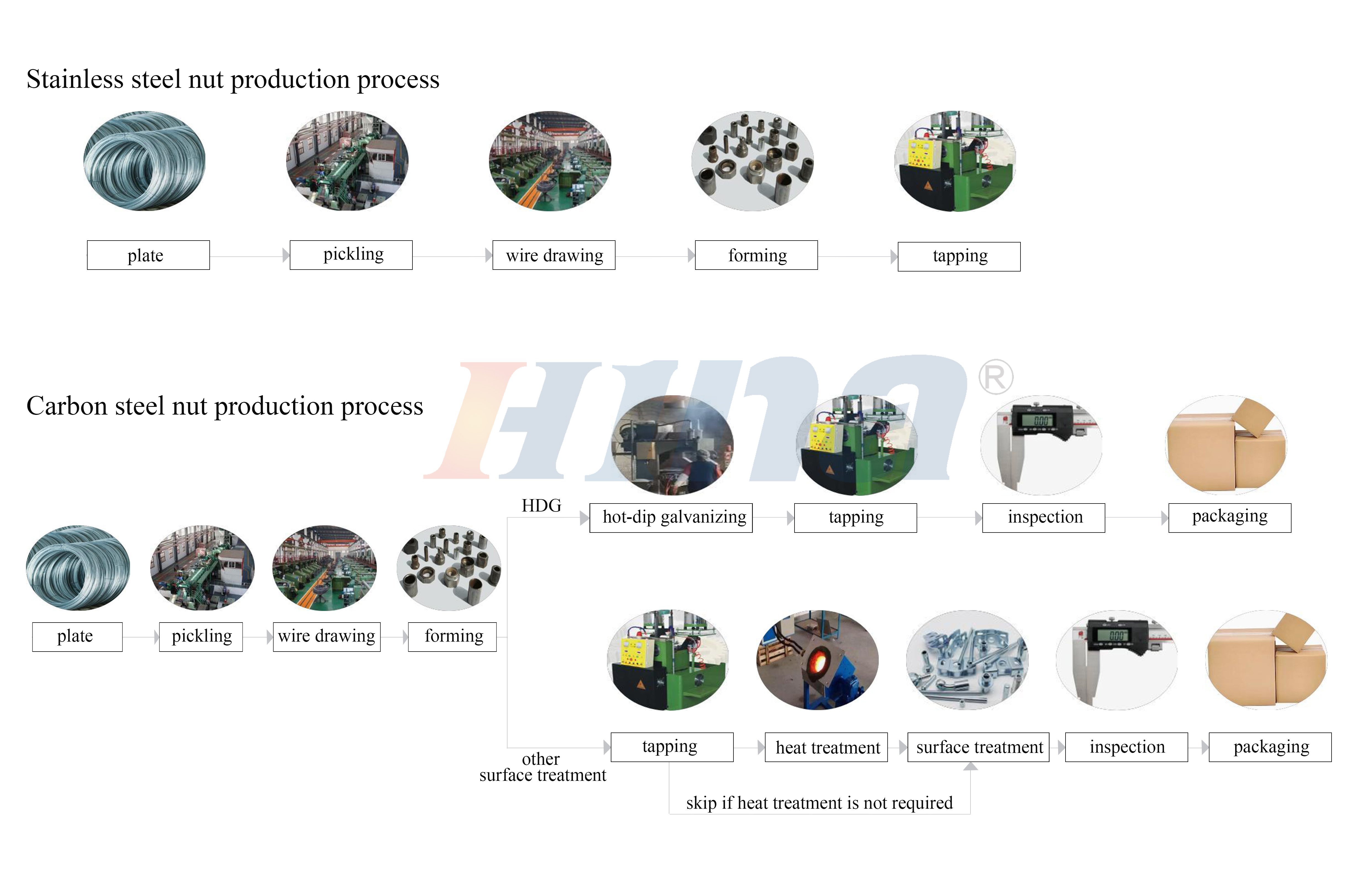- All
- Product Name
- Product Keyword
- Product Model
- Product Summary
- Product Description
- Multi Field Search
| Availability: | |
|---|---|
| Quantity: | |






DIN6923
HNF
HINA2025012005
Definition:
A galvanized flange nut is a type of nut with a flange (a protruding edge) on one side and a galvanized coating on its surface. The galvanized coating is typically applied through electroplating or hot-dip galvanizing to improve its corrosion resistance. The flange design increases the contact area, helps distribute the load, and enhances the stability of the connection.

Flange Design:
The galvanized flange nut has a protruding flange on one side, providing a larger contact area to enhance fastening force and help distribute pressure, preventing localized pressure concentration.
Galvanized Surface:
The galvanizing process forms a zinc layer on the nut surface, which effectively protects the nut from rust or oxidation, making it suitable for humid or corrosive environments.
Improved Anti-loosening Performance:
The flange design helps prevent the nut from loosening, especially under vibration or external forces, ensuring a more stable and secure connection.
High Durability:
Galvanized nuts typically have a longer service life and can withstand harsher working environments, particularly those with high humidity or corrosive gases.
Corrosion Resistance:
The zinc coating provides effective corrosion protection, especially for outdoor or humid environments, extending the service life of the nut.
Good Anti-loosening Performance:
The flange helps distribute pressure and provides additional friction, making it harder for the nut to loosen under vibration or external forces, ensuring a more secure connection.
Cost-effective:
Compared to stainless steel or other high-end materials, galvanized flange nuts are more affordable while still offering good performance, making them a cost-effective choice.
Strong Adaptability:
Galvanized flange nuts are suitable for a wide range of environments, particularly in conditions with certain levels of corrosion or heavy loads.

Mechanical Equipment:
Galvanized flange nuts are commonly used in mechanical equipment and machinery components, especially where corrosion resistance is required.
Construction Industry:
In construction structures, galvanized flange nuts are used for fastening and securing components, particularly in outdoor or humid environments.
Automotive Industry:
These nuts are used for connections in automotive chassis, engines, and other components, enhancing connection stability and preventing rust.
Piping Connections:
Galvanized flange nuts are used for fastening pipe connections in water, gas, and other piping systems, preventing loosening due to pressure or vibration.
Energy and Power Industry:
They are widely used in the power, oil, and gas industries, especially in outdoor and humid environments, providing strong corrosion resistance and durability.
Overall, galvanized flange nuts, with their excellent corrosion resistance and reliable fastening performance, are indispensable fasteners in many industrial fields.
Haina is committed to providing customers with high-quality stainless steel standard fasteners and professional services to meet various engineering needs. We have a large amount of spot inventory to ensure fast delivery and save you waiting time. In addition, we provide the following value-added services to help your purchasing experience:
1. Free samples: provide samples for customer testing.
2. 3.1 Test report: quality test report that meets international standards.
3. Video factory inspection: support video factory inspection to demonstrate production process and quality management.
Advantages
- Sufficient inventory: quick response to order requirements.
- Quality assurance: strict quality control to ensure product reliability.
Haina is committed to providing efficient and high-quality fastener services.

What are the different types of nuts?
Common types include hex nuts, lock nuts, wing nuts, square nuts, and flange nuts.
How do you tighten a nut?
A nut is tightened by turning it clockwise onto a bolt using a wrench or spanner. It should be tightened firmly, but not over-tightened to avoid damage.
Definition:
A galvanized flange nut is a type of nut with a flange (a protruding edge) on one side and a galvanized coating on its surface. The galvanized coating is typically applied through electroplating or hot-dip galvanizing to improve its corrosion resistance. The flange design increases the contact area, helps distribute the load, and enhances the stability of the connection.

Flange Design:
The galvanized flange nut has a protruding flange on one side, providing a larger contact area to enhance fastening force and help distribute pressure, preventing localized pressure concentration.
Galvanized Surface:
The galvanizing process forms a zinc layer on the nut surface, which effectively protects the nut from rust or oxidation, making it suitable for humid or corrosive environments.
Improved Anti-loosening Performance:
The flange design helps prevent the nut from loosening, especially under vibration or external forces, ensuring a more stable and secure connection.
High Durability:
Galvanized nuts typically have a longer service life and can withstand harsher working environments, particularly those with high humidity or corrosive gases.
Corrosion Resistance:
The zinc coating provides effective corrosion protection, especially for outdoor or humid environments, extending the service life of the nut.
Good Anti-loosening Performance:
The flange helps distribute pressure and provides additional friction, making it harder for the nut to loosen under vibration or external forces, ensuring a more secure connection.
Cost-effective:
Compared to stainless steel or other high-end materials, galvanized flange nuts are more affordable while still offering good performance, making them a cost-effective choice.
Strong Adaptability:
Galvanized flange nuts are suitable for a wide range of environments, particularly in conditions with certain levels of corrosion or heavy loads.

Mechanical Equipment:
Galvanized flange nuts are commonly used in mechanical equipment and machinery components, especially where corrosion resistance is required.
Construction Industry:
In construction structures, galvanized flange nuts are used for fastening and securing components, particularly in outdoor or humid environments.
Automotive Industry:
These nuts are used for connections in automotive chassis, engines, and other components, enhancing connection stability and preventing rust.
Piping Connections:
Galvanized flange nuts are used for fastening pipe connections in water, gas, and other piping systems, preventing loosening due to pressure or vibration.
Energy and Power Industry:
They are widely used in the power, oil, and gas industries, especially in outdoor and humid environments, providing strong corrosion resistance and durability.
Overall, galvanized flange nuts, with their excellent corrosion resistance and reliable fastening performance, are indispensable fasteners in many industrial fields.
Haina is committed to providing customers with high-quality stainless steel standard fasteners and professional services to meet various engineering needs. We have a large amount of spot inventory to ensure fast delivery and save you waiting time. In addition, we provide the following value-added services to help your purchasing experience:
1. Free samples: provide samples for customer testing.
2. 3.1 Test report: quality test report that meets international standards.
3. Video factory inspection: support video factory inspection to demonstrate production process and quality management.
Advantages
- Sufficient inventory: quick response to order requirements.
- Quality assurance: strict quality control to ensure product reliability.
Haina is committed to providing efficient and high-quality fastener services.

What are the different types of nuts?
Common types include hex nuts, lock nuts, wing nuts, square nuts, and flange nuts.
How do you tighten a nut?
A nut is tightened by turning it clockwise onto a bolt using a wrench or spanner. It should be tightened firmly, but not over-tightened to avoid damage.